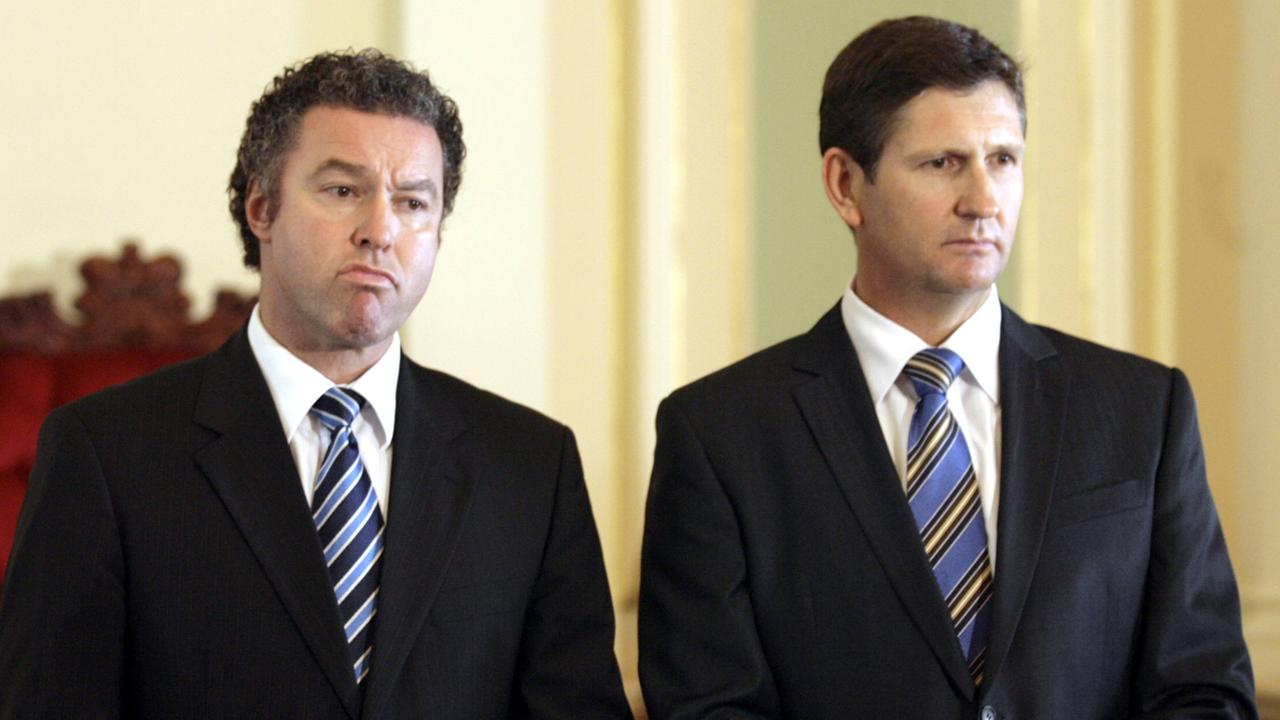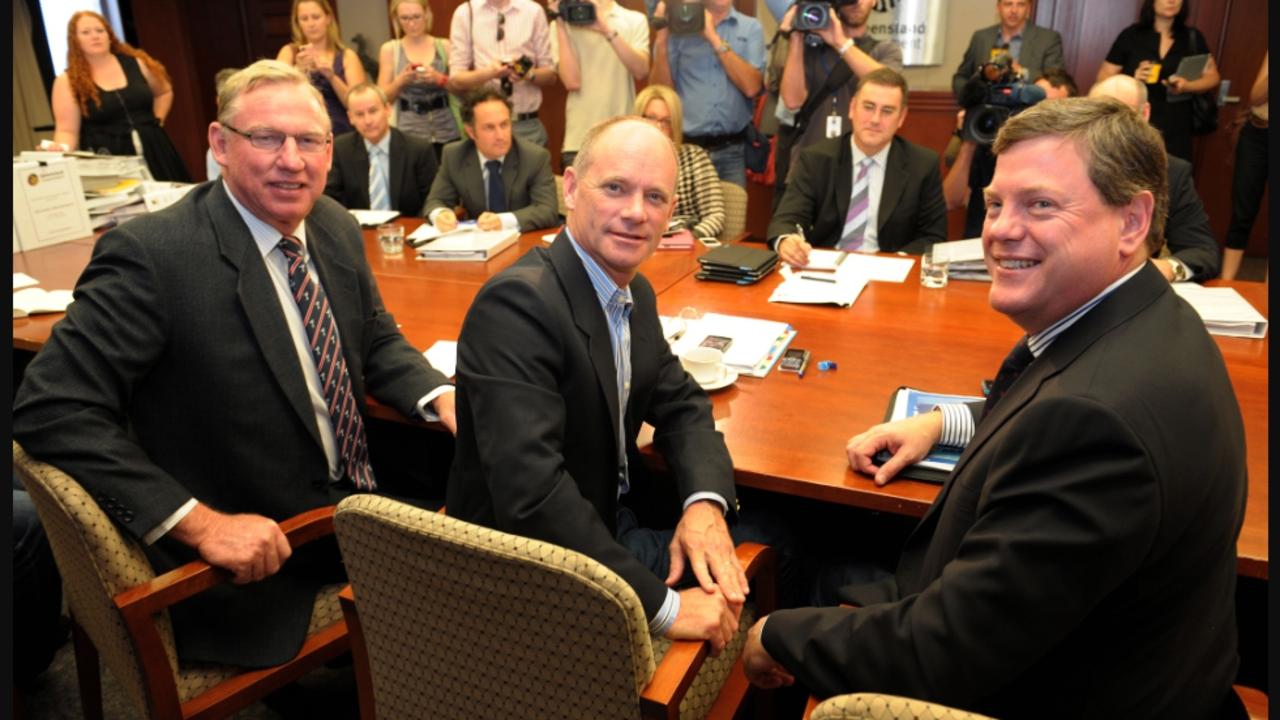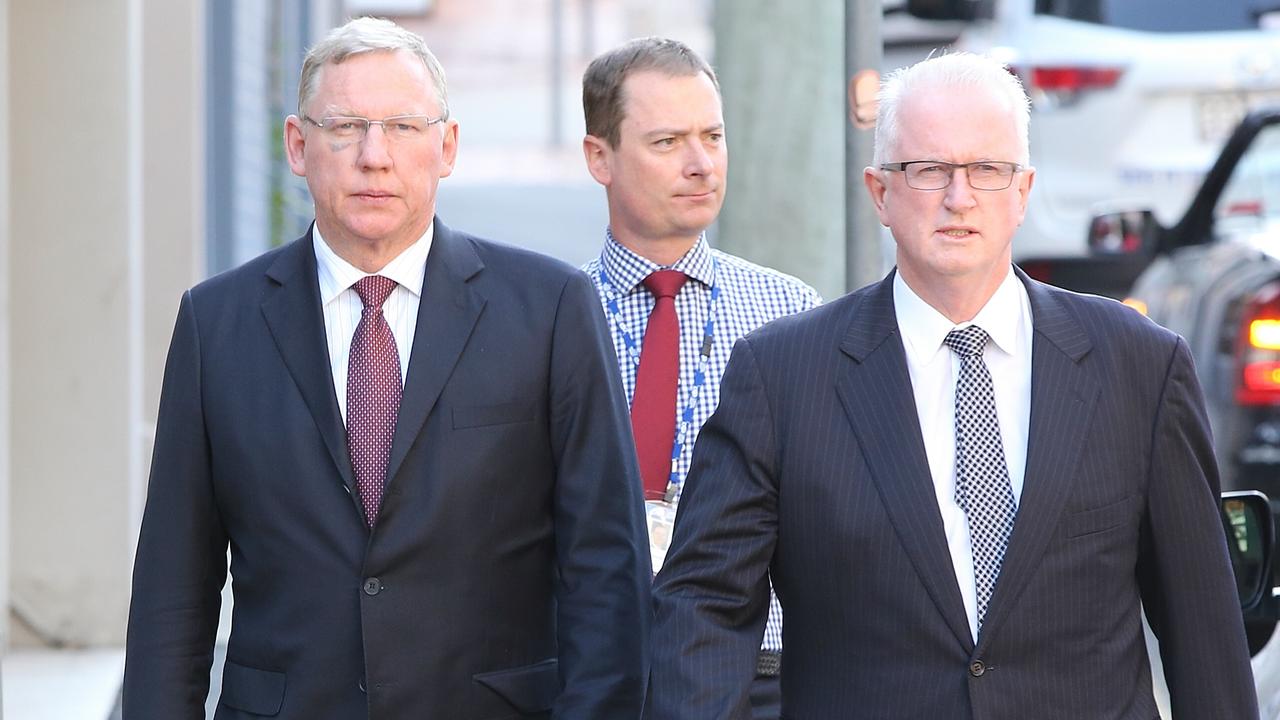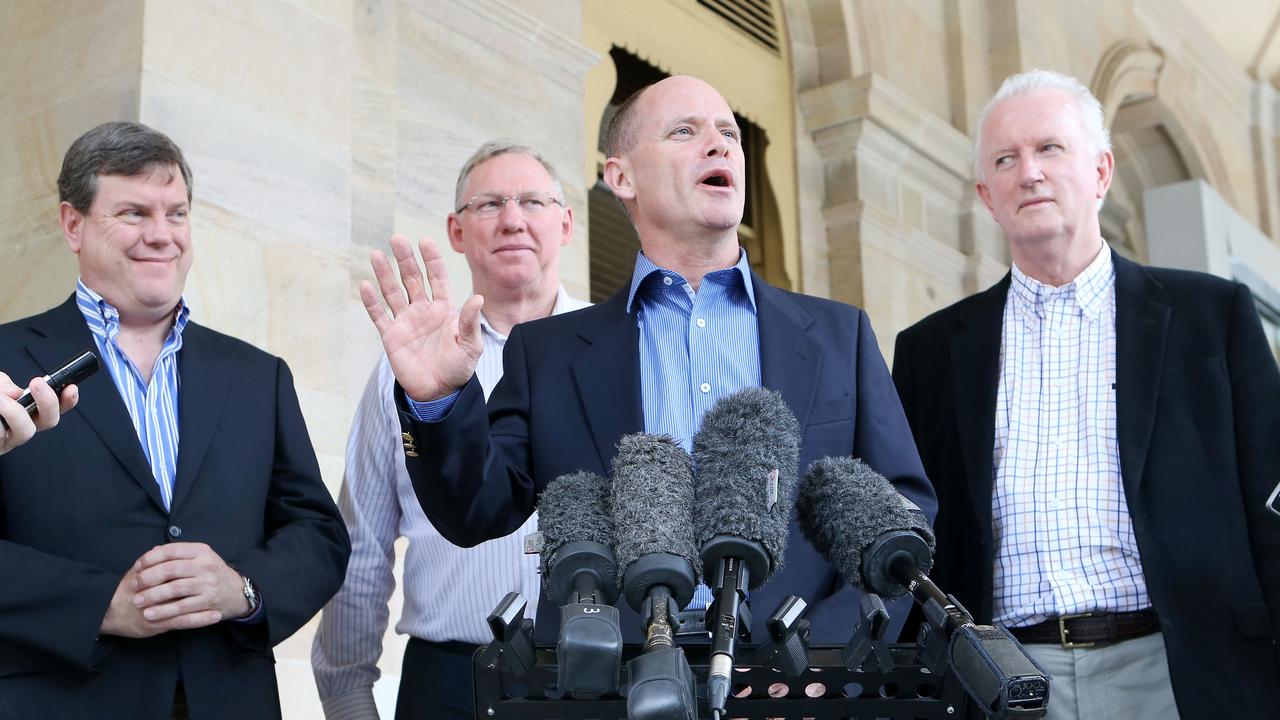War Within: Queensland’s LNP makes House of Cards seem harmless
Bloodletting, treachery and lies – the Queensland LNP has been battling itself, but will the party’s toxic past curse them at the polls? Read Peter Gleeson’s special investigation.
QLD News
Don't miss out on the headlines from QLD News. Followed categories will be added to My News.
“You’re a useless c**t and we’re going to get rid of you,” snarled LNP powerbroker Barry O’Sullivan.
It was January 2011.
The malignant brown ocean which swallowed riverside Brisbane suburbs had barely drained from sodden homes.
Toowoomba and the Lockyer Valley hadn’t yet found all their dead, let alone buried them.
But in a Brisbane office, a pugnacious political headkicker with long jowls and a short fuse was sentencing LNP leader John-Paul Langbroek to political death.
THE WAR WITHIN
- ‘Era of distrust’ that brought down LNP from inside
- The real reason why the LNP keeps failing
- How drinks on Clive Palmer’s yacht sparked a coup
- Poison pen letter reveals LNP plan to oust Jeff Seeney
- LNP architect’s dire warning over division
Langbroek had been comfortably ahead of Labor’s Anna Bligh in the polls and was on track to become Queensland’s next premier when Mother Nature intervened.
His unforgivable sin, in the eyes of O’Sullivan, then LNP treasurer, was a strategic decision to lie low and avoid politicising the floods.
O’Sullivan told Langbroek that he should be “hiring a chopper and heading up to Toowoomba’’. O’Sullivan today disputes he swore or threatened Langbroek, however the conversation was confirmed by others in the room.

“Get out to Kedron (home of the Emergency Services) and kick down the door and demand a briefing,’’ O’Sullivan said.
Believing that politicking during the disaster would backfire, Langbroek stood his ground.
What followed would change the course of Queensland history.
The next two months were messy – and bloody – within the LNP.
Another natural catastrophe, Cyclone Yasi, devastated north Queensland, and then LNP president Bruce McIver stunned many party elders when he made the extraordinary decision to go to Parliament House to publicly lambaste Langbroek.
It was a move which showed an extraordinary disconnect between the LNP organisational wing – which was fixated on Langbroek and what they feared was a political disaster – and ordinary Queenslanders – who were fixated on natural disasters.
But the end of March, Langbroek’s leadership was dead and Brisbane Lord Mayor Campbell Newman had been parachuted in as party leader.
The all-powerful backroom bosses of the LNP had spoken.

The move was designed to set the LNP for a generation in power in Queensland.
But a decade on, the party is a powder-keg of distrust and vengeance.
The demise of Langbroek’s leadership might well be a footnote in the long and colourful story of Queensland conservative politics, but it foretold the Machiavellian posturing which has become something of a speciality for the LNP’s backroom, its state executive. Think Netflix’s House of Cards, Queensland-style.
The role of the all-powerful backroom bosses in the latest political disaster – the attempted political execution and failed campaign of Deb Frecklington – has brought the LNP to boiling point.
And at the heart of the party’s dysfunction and drama is the large and enduring shadow cast by Clive Frederick Palmer.
‘F*ING AMATEUR HOUR’
Even for the ruthless, transactional world of politics, the level of hatred felt by some key current and former MPs towards the party’s organisational wing is red hot.
“It’s a cabal,’’ one figure says.
Another MP confided: “It’s f….g amateur hour.”
The disintegration of the LNP electoral prospects in Queensland, insiders say, is simply because of a power game at the top. “These people are volunteers. They can be very powerful if they want to be, and once they get a taste of what they can do, it’s game on,’’ a former MP said.
In the corporate world, if a company is in trouble it is the shareholders who determine the fate of boards.

But in the modern-day LNP, the shareholders are the volunteers and members and they’re powerless to act.
And dissenters are banished, suspended by the party executive for daring to speak publicly.
“If these guys were a listed company, they’d all be gone,’’ said one MP.
“They have presided over mediocrity and treachery for years.’’
An investigation for the Saturday Courier-Mail, Sunday Mail and Sky News has gained a deep insight into the war within the LNP and the fractures which conservative stalwarts fear will even destroy the party’s chances taking government in 2024.
After interviews with more than 35 key players, it is clear this is a party in crisis.
In one of the great ironies of Queensland politics, it’s a power struggle which is costing them power.
At a recent Sunshine Coast LNP “love in’’ of sitting MPs – aimed at coming up with an election winning strategy to take new leader David Crisafulli to power – the dysfunctional relationship between the party headquarters and parliamentary wing was discussed when MPs were asked to characterise the major challenges facing the party.
Former leader Tim Nicholls was one who spoke, but it was an exasperated Langbroek who asked the question of the day.
“What happens when they tire of this bloke,’’ he said, pointing a finger at new leader, Crisafulli.

THE PLAYERS
For a political baby conceived in large part to deliver conservative state governments in
Queensland, the LNP is leading a troubled young life.
Losing four of the following five state elections is hardly what Bruce McIver had in mind when, as founding president after the 2008 merger of the Nationals and Liberals, he heralded the party’s birth as the“ beginning of hope for the people of Queensland”.
There have been some exceptional successes.
The LNP played a key role in catapulting Scott Morrison back into the Lodge against all odds in 2019 when it captured 23 of Queensland’s 30 federal seats, leading to the PM’s famous refrain: “How good is Queensland”.
But the party’s soiled laundry was on show just over a year later when its most senior
federal MP, Home Affairs Minister Peter Dutton, was so incensed by a bungled move on
Frecklington’s leadership by the state executive 20 weeks from polling day, that he publicly demanded then president Dave Hutchinson quit his post over the failed coup.
While current president Cynthia Hardy, a small businesswoman and grandmother-of-nine who rose through the party after chairing its Toowoomba South branch, took over the presidency when Hutchinson finally fell on his sword, insiders insist the party is in effect run by an “old guard’’ that clings to power
The party – multiple insiders claim – has lost its moral and ethical compass, with the use of an effective Star Chamber to interrogate potential candidates a pivotal part of the intimidation process.
So who are some of these backroom players who exercise so much power within the party?
Among the members of the “old guard’’ are McIver, Hutchinson, state director Michael O’Dwyer, legal adviser Bernard Ponting, a Gold Coast lawyer, and O’Sullivan.
Trucking magnate McIver, who at 19 started as a driver for his family’s transport business based near Dalby before building up the operation and later becoming a leading industry figure, was president from the merger in 2008 to 2015.

He was appointed to the board of Australia Post by Malcolm Turnbull and has had a long business association with Clive Palmer, serving as a director on Palmer companies.
McIver says he hasn’t had anything to do with the day to day running of
the LNP since he left as president.
But others insist as a life member he remains a strong and influential figure.
Fellow powerbroker O’Sullivan is one tough cookie.
Growing up in the Rockhampton area, he left school at 14, and after struggling as a cadet journalist on the Longreach Leader, joined a road-building crew in the Gulf.
A police detective for 15 years, he undertook a research scholarship with the FBI, studying and profiling serial killers.
The boy from the bush and lifelong cattleman also became a shrewd developer and O’Sullivan boasted a portfolio of about 50 investment properties by the time he was handed a Senate seat in 2014.
O’Sullivan used his maiden speech to parliament to brag about his penchant for troublemaking.
“In Irish folklore, those blessed with the surname O’Sullivan caused disruption and strife,’’ he said. “Accordingly, I feel my involvement in their ranks to be a good fit.’’
However his career in Canberra was cut down after he was beaten by one vote by Susan McDonald for the coveted second Senate spot in 2019. It was one win for forces who sharpened their knives because of his polarising nature.

In the middle of it all is Clive Palmer, the multi-billionaire former life member who was a National Party campaign director at one point during the Sir Joh Bjelke-Petersen era.
Once one of the party’s greatest backers, he became one of its great enemies, then helped Scott Morrison back into the Lodge in 2019 but remains head of a rival political party while maintaining business relationships with key LNP figures.
McIver remains on Palmer’s books while Hutchinson was controversially employed by the tycoon while LNP president.
Former president Gary Spence is also said to be part of the current leadership group.
More broadly in the party ex-premier Rob Borbidge remains a voice of reason, and then there’s the Liberal Party’s old guard, headed up by the warhorse, former senator Santo Santoro.
The enmity between former Nationals strongmen who have held an iron grip on the party administration and the city-based Liberals is toxic.
Among Santoro’s allies are Dutton and former federal MP Gary Hardgrave.
Former opposition leader Tim Nicholls and former deputy premier Jeff Seeney, who hailed from Monto in the North Burnett, are others who are known within the party to be deeply critical of the organisation wing.
Prominent senators Amanda Stoker, James McGrath and Matt Canavan are all understood to be incredibly frustrated with the LNP’s most recent state election result.
BLIGH’S PANIC
The political events of early 2011 after two natural disasters remain significant because they echoed through to 2020 – when Frecklington was behind in the polls in the middle of the COVID-19 crisis.
After the devastating Brisbane floods, an empathetic and strong premier Bligh ¬ and Labor – which had been trailing the LNP 42-58 2PP in one poll – received a remarkable spike in popularity
After the floods came Cyclone Yasi in north Queensland and, once again, Ms Bligh was out there every night on the 6pm news, telling Queenslanders to be stoic and resilient.
Again, there was a big spike in her popularity ratings, while Langbroek’s fortunes dipped.
Fearing another “defeat from the jaws of victory” moment similar to the one they had endured in 2009 when Bligh overcame Lawrence Springborg, senior party figures panicked and started the process of drafting the hugely popular Campbell Newman to run as opposition leader.
Their rational was simple – we giveth and we can taketh away after backing Langbroek for leader.

Today O’Sullivan insists he did not use colourful language in his conversation with Langbroek – nor threaten the opposition leader, but in a nod to his tough image admits people will be unlikely to believe him.
“I know I’m renowned for my colourful language but John-Paul was the opposition leader and I respected that and I did not use that language,’’ he said. “Nobody will believe me based on my past record but that’s the truth.’’
One insider said: “Langbroek was a really good opposition leader and he may not have won by as much as Campbell did, but maybe that wouldn’t have been such a bad thing.
“Bligh’s numbers were always going to spike after the floods and Yasi. That’s what happens in Queensland.
“But they were always going to come back and I have no doubt that if they didn’t axe John-Paul, he’d be premier still today.’’
The March 2011 ascension of Newman seemed, at the time, to be an LNP backroom masterstroke. It certainly rattled Labor.

The Saturday Courier-Mail can reveal Bligh wanted to call a snap election the day Newman took over as LNP leader.
A well-placed Labor source revealed Bligh made an urgent call to then Labor state secretary Anthony Chisholm and told him she was going to call an election that day. Chisholm drove to George Street to see the premier.
“He counselled against going straight away,’’ the source said.
“She took his advice. With the benefit of hindsight it might have been better to go early.’’
When Queenslanders did finally go to the polls in February 2012, Newman’s election avalanche should have set the LNP up for a three-term reign.
Winning an extraordinary 44 seats was more a blue murder than a landslide, reducing Labor to just seven MPs (which were famously enough able to fit in a Toyota Tarago) and creating an unlikely Labor leader in Annastacia Palaszczuk. If the LNP had turned squandering opportunities into an art form, Labor did the opposite.
The scale of the triumph had maverick billionaire Palmer literally dancing in jubilation.
But within months the victory jig was replaced by a choker hold; Newman suddenly had a Clive Palmer-sized problem that would dog his government right to the day of its unexpected death.
And the party’s own backroom powerbrokers were right in the middle of the trouble.

POISON LETTER
During the Newman government’s reign, the three men who ran the show were premier Campbell Newman, deputy premier Jeff Seeney and treasurer Tim Nicholls.
They were a powerful triumvirate and all roads led to these individuals if you wanted something done in Queensland at the time.
Seeney, an old National Party warhorse, was seen by McIver, O’Sullivan and Ponting, as an ally.
But it soon became clear that the issues that were being promulgated by senior party people were not as a high a priority for Newman, Nicholls and Seeney.
When representations were made to have certain projects looked upon favourably and be given priority – and the trio knocked them back – the tensions rose.
Palmer was the great National Party backer who was fast becoming the LNP government’s most bitter enemy.
And McIver was on his payroll in 2012 – as a director of five of the maverick rich-lister’s Singapore-registered companies.
By April 2012, within weeks of the election, according to court documents, Palmer demanded preferential treatment from Seeney for a Galilee Basin coal mining venture, saying: “I have paid a lot of money to get you guys elected and I have a lot more money to continue to do that in the future.”
Another of the projects championed by the party headquarters was Clive Palmer’s expression of an interest to acquire government land near the Sunshine Coast airport.
Seeney used his ministerial discretion and knocked back the plan. He later arranged for the land to be gifted to the Sunshine Coast Council.
Today, Mr Palmer’s spokesman says the tycoon cannot remember making any representations regarding land near the Sunshine Coast airport. “It’s ancient history,’’ the spokesman said.

In public things were dramatic enough; Newman explosively claimed Palmer had sought to use LNP party people “to put pressure on the government over a range of things’’.
“He thinks he can use the LNP hierarchy to bully the government and it’s not going to happen.’’
But an astonishing drama occurring concurrently behind closed doors has remained a secret – until now.
The Saturday Courier Mail can reveal that at the height of the conflict, Newman, Nicholls and Seeney were informed by their own party president that he had received an anonymous letter making a series of unsubstantiated allegations of a personal and private nature,
The party hierarchy said they would refer the claims to the police.
When the trio asked if they could see the letter, McIver refused to hand it over.
On another occasion, someone at party headquarters told Seeney they had a “dirt file’’ on certain parliamentary individuals, including him.
They raised a serious allegation about his personal life, asking him to step down as deputy premier and refer it for further investigation.
Saying the claims were untrue, Seeney refused.
Furious at both the extraordinary situation behind closed doors and McIver’s public comments in opposition to the premier’s plans to slash government funding of political parties and public sector job cuts, Seeney sent a letter to the LNP’s state executive, demanding McIver resign as president.
However his revolt stalled after the letter was tabled at a meeting of the executive.
Realising McIver had the numbers he withdrew the demand.

When asked to comment last week on the relationship between the Newman government and the party headquarters, Seeney was scathing: “From the day the LNP was created in Queensland, there has been a complete lack of understanding of the role of the headquarters.
“The proper relationship (between the entities) was completely misunderstood. Those in the senior executive positions came from the corporate world and they were used to being in control. It became a toxic problem.’’
Seeney said the party organisation “caused our government more stress and distress than the Labor Opposition’’.
“Our government was put under tremendous pressure. For every action there was a reaction,’’ he said.
ERA OF DISTRUST
McIver says he was not involved in any representations made on behalf of Mr Palmer to buy land near the Sunshine Coast airport and that two other people in the hierarchy handled the anonymous letter issue. “I didn’t want anything to do with that,’’ he said.
McIver said he did not want to comment on claims that the party was in turmoil because
“I’m out of that now’’.
In fact, issues between Newman and the party HQ dated back to shortly after he became opposition leader.
In April 2011 Newman publicly supported gay marriage – a move unthinkable to a party machine whose conservatism was closer to the Joh era – and all hell broke out within the state executive.
The tensions became so bad while Newman was in government that the Premier’s office would go months without talking to HQ.
But there were occasions when the issues were caused by the parliamentary wing, such as the day one of Newman’s minders was asked by headquarters if the premier could poke his head into a morning tea of CWA volunteers, headed up by the wife of the LNP’s biggest donor, at Parliament House.
The message was never passed on.
“There was just distrust every day,’’ a former aide said.

Many insiders insist the relationship breakdown between headquarters and the Newman government contributed significantly to the 2015 so-called “unlosable’’ election result.
Palmer campaigned mercilessly against the LNP – his slogan was simple and personal: “Goodbye Campbell Newman”.
Newman has previously spoken of his disappointment that McIver, who remained a director of Palmer companies until 2013 “didn’t see it was a major conflict of interest” to be “on Clive’s payroll at a time when Clive was fighting the party”.
Now he says there were “clearly issues on both sides of the party that need to be sorted’’.
“Seeney is right … we saw (that interference) within government where they overstepped the mark,’’ he told The Saturday Courier Mail.
“But it’s not all one-way traffic. The parliamentary team in the past has shown scant regard – maybe an arrogance – to those that helped them get elected.
“Parliamentarians need to listen to the rank and file.
“(New leader David) Crisafulli has to bring this to a head. He has to insist that shadow cabinet engages with the policy committees.’’
Even after politics Newman has not been immune from the ire of party HQ – it sensationally threatened to expel the former premier for criticising the party in the wake of the 2017 election loss.
But Newman says it is not right to solely point the finger at party headquarters for the poor election results.
“The MPs have to take some blame,’’ he said.
“They have underperformed on policy. That is a fact.’’
MERCILESS WHITE-ANTING
The tensions between party bosses and MPs flared again when Tim Nicholls succeeded Lawrence Springborg as opposition leader in 2016.
Those close to Tim Nicholls say he was never accepted as the alternative premier by party HQ.
A product of the inner-city Liberal elite, he was seen as too urbane for the party bosses.
And after Nicholls, Frecklington was white-anted unmercifully by the political machine.
It has left the LNP faithful, the thousands of branch volunteers and donors, angry and upset, asking the question how and why it has come to this?

Former Nationals premier and party elder statesmen Rob Borbidge is one of the few who will talk on the record about the dysfunction.
“There is no doubt the organisational side has baggage in their dealings with the
parliamentary party,’’ Borbidge says.
“This friction isn’t new. After the death of the Newman government, my former deputy Joan Sheldon and I did a review and it was clear that both wings of the party had not spoken to each other for a long period.
“It’s better now but it has to get better still, and a concerted effort is required from both sides (because) it can’t be an ‘us versus them’.
“It’s always there (the tension), a bit anyway. That doesn’t matter as long as they get on with it.’’
Those close to headquarters lay the blame squarely on the state parliamentary team.
“The state team are the issue and even now, they are trying to blame anyone but themselves,’’ one figure said.
“I wonder are Labor blaming their organisation in Queensland for losing all the federal elections and Brisbane City campaigns?
The figure pointed to the LNP’s three consecutive Brisbane City Council election victories, and the fact the party had won 70 per cent of federal seats in Queensland in every election since 2012 as evidence that the state team was the problem.
“So how does one explain all this and ever blame the organisation for the state losses,’’ one organisation figure said.
SCORPION AND THE FROG
Another former senior aide traced the tensions back long before the 2008 merger.
“The party headquarters people can wield power and have been doing so since the Mike Ahern days. Remember (former premier) Russell Cooper, who was in the job six weeks?” the aide said.
“The old Nats did that. The party bosses remind me of the scorpion in the story of the scorpion and the frog. The frog wants to get to the other side of the river and the scorpion asks if he can go across on the back of the frog.
“The frog thinks about it and realises that if the scorpion does sting him, they will both die, so he says okay. They get halfway across the river and the scorpion stings the frog. The frog says ‘why did you do that, we will both die now’.
“The scorpion says, ‘I can’t help it, it’s in my DNA’.’’

Former federal Liberal MP and current Sky news broadcaster Gary Hardgrave is even more blunt.
“The hierarchy all needs to go – there needs to be a complete purge and it needs to happen now,’’ he said.
Hardgrave said the enmity between him and the party bosses began in 2008 when he championed a motion at state executive to have Crosby-Textor do research to guide the 2009 election strategy.
McIver opposed the motion and, when put to a vote, Hardgrave’s resolution failed by a single vote.
Hardgrave says just about every person who sided with him has since either left the party or been banished.
“Hundreds have gone,’’ he said.
“Before the merger, those suspended or leaving the party you could count on one hand.’’
“Paranoia strikes deep within the papacy of the LNP,’’ said Hardgrave.
“They don’t care about the past. The culture is rotten.’’
Read related topics:LNP



